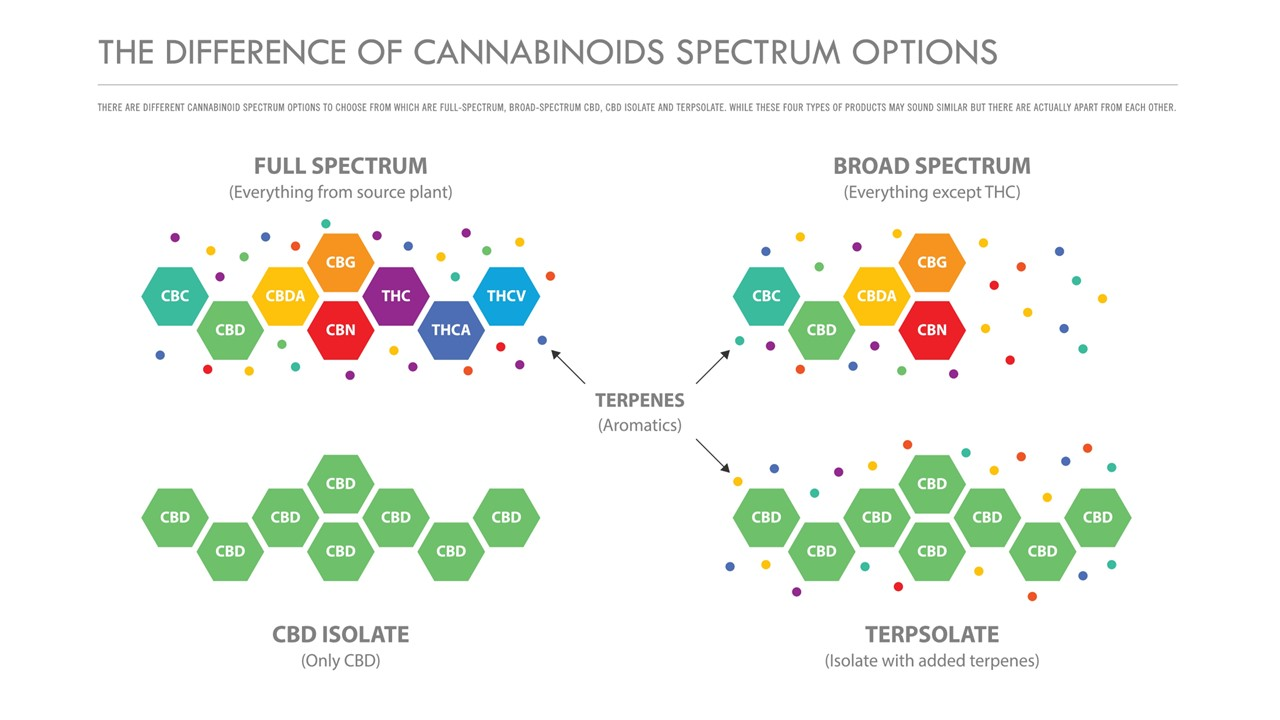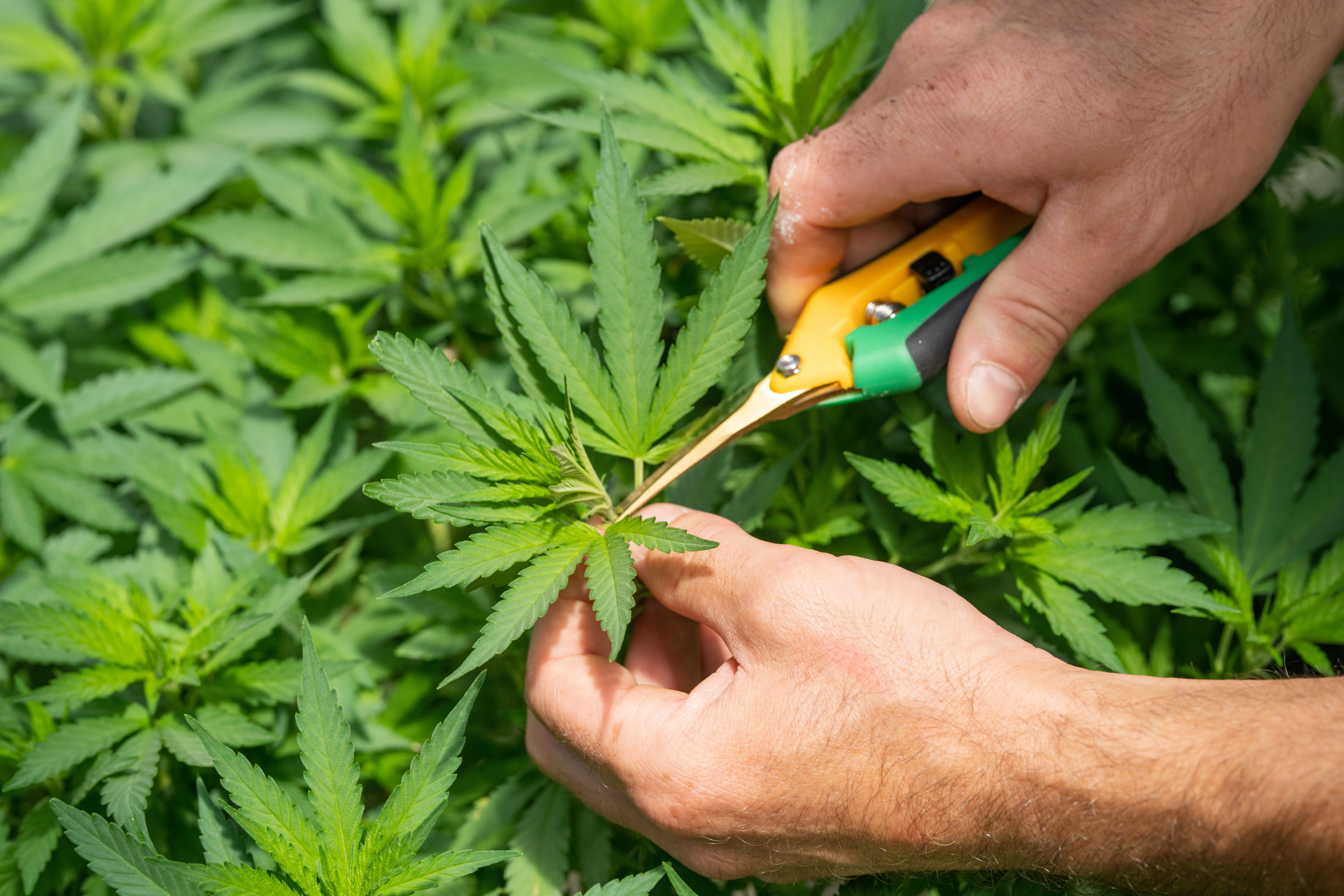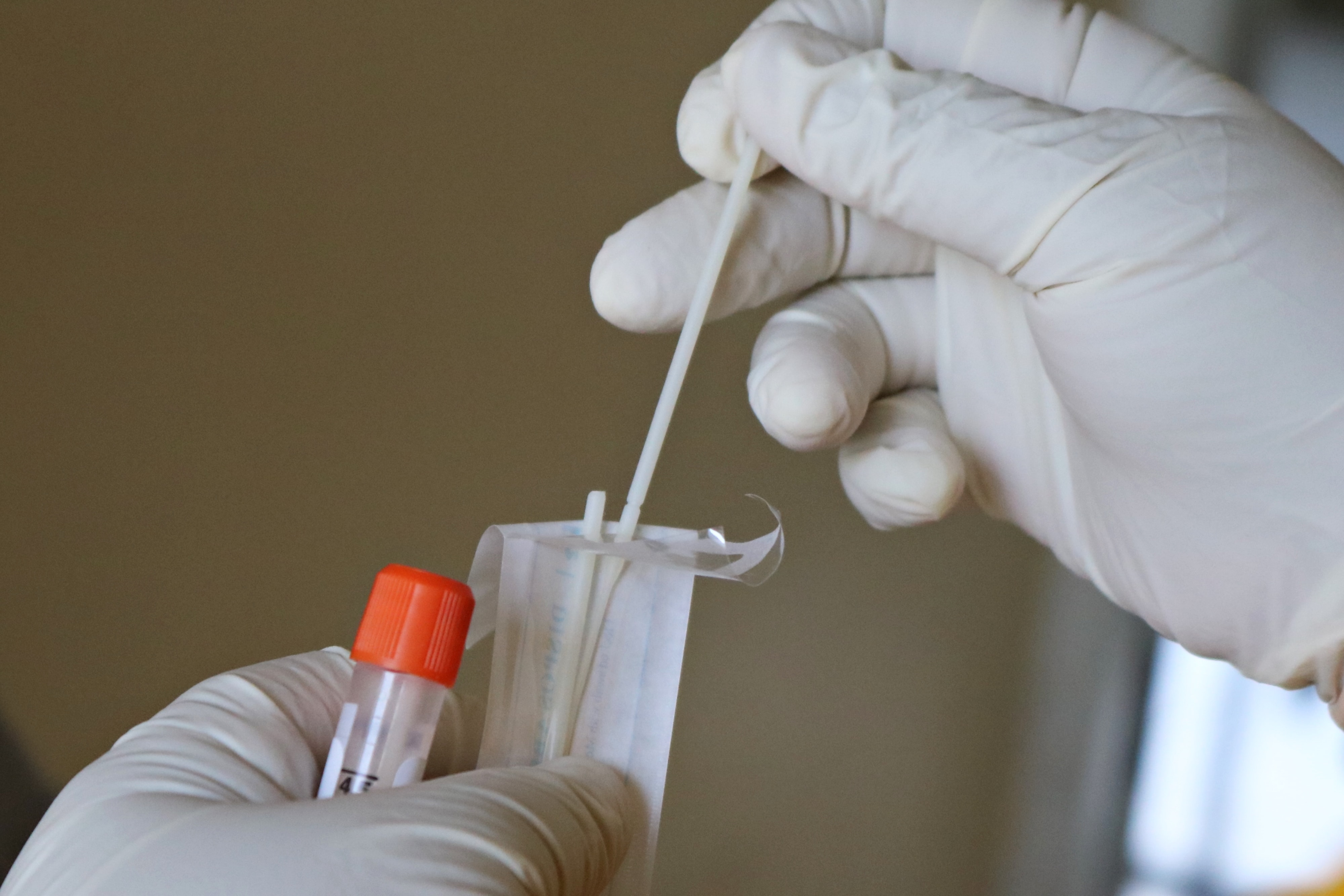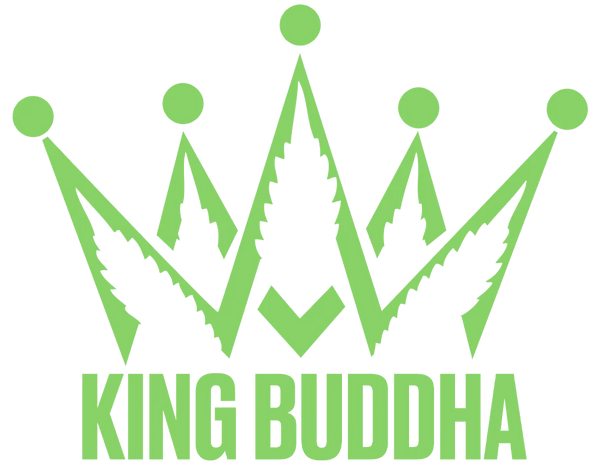
Difference between Full Spectrum vs Broad Spectrum CBD | King Buddha
Share
You probably came across many different spectrums of cannabinoids based on the product type. This category includes full spectrum CBD broad spectrum CBD isolates. The labeling on these oils will help identify the cannabinoid ingredients in their products. Depending upon the type you prefer the different types have different advantages and disadvantages. The main difference between broad spectrum or fully spectrum CBD is that you will know which one is better for you.
What is CBD? Tell me the meaning of CBD?
If you know CBD, or cannabinoid you can skip that section. Before we look into different spectrums of CBD we can talk about its significance. Cannabinoids CBD is an herb in the cannabis family that contains more than 120 different phyto-cannabinoids. The terms phytocannabinoid and "phytanol" mean plant chemicals. It has been legalized as a new dietary supplement in 2018. It also included legal differences between hemp and marijuana, and regulated hemp goods.
CBD History:
CBD is one of the active ingredients in cannabis. It is also known as cannabidiol. CBD is derived from the hemp plant. The history of CBD can be traced back to ancient times. The first recorded use of CBD was in 2737 BC by the Chinese Emperor Shen Nung. In ancient Greece, CBD was used to treat a variety of conditions such as pain, inflammation, and seizures. In the early 1800s, CBD was introduced to the Western world by physician William O'Shaughnessy. Since then, CBD has been used to treat a wide range of ailments including anxiety, depression, pain, and inflammation. research on the potential medical benefits of CBD is ongoing, and it is hoped that this natural remedy will soon be available to people all over the world.
CBD extraction processes
vary depending on the desired outcome and quality of the extract. Some of the more common methods include CO2 extraction, ethanol extraction, and oil extraction.
CO2 extraction is a popular method due to its efficiency in extracting full spectrum CBD oil with minimal degradation or contamination. It utilizes carbon dioxide under high pressure and low temperatures to separate out compounds from hemp plants, resulting in a clean, pure product with excellent potency.
Ethanol extraction uses ethanol as a solvent to draw out beneficial cannabinoids such as CBD. This process produces an extract that contains all of the plant’s naturally occurring compounds including terpenes and other beneficial phytochemicals.
Oil extraction involves soaking hemp plants in a carrier oil for an extended period.
The endocannabinoid system (ECS)
The endocannabinoid system ( ECS) is a network of receptors and chemicals that play a role in many physiological processes. The ECS is involved in regulating mood, memory, appetite, sleep, and pain. It is also thought to play a role in maintaining homeostasis, or balance, in the body. The two main types of receptors in the ECS are CB1 and CB2 receptors. CB1 receptors are found mainly in the brain, while CB2 receptors are found mainly in the immune system. Endocannabinoids are molecules that bind to these receptors and activate them. When endocannabinoids bind to CB1 receptors, they can alter mood, memory, and perception. When they bind to CB2 receptors, they can affect inflammation and pain. The ECS is believed to be involved in a wide range of medical conditions, including pain, inflammation, anxiety, and addiction. Research on the ECS is ongoing, and it holds promise for the treatment of many conditions.
Different spectrums of CBD extracts
CBD extract types include Full Spectrum CBD Oil, Broad Spectrum CBD Oil, and Isolate CBD oil.
Full spectrum contains all of the cannabinoids present in hemp plants including THC, CBG, and CBN. This provides an entourage effect that can be beneficial in providing additional therapeutic effects when compared to taking just one cannabinoid alone.
Broad spectrum extract contains a number of cannabinoids but excludes THC. This type of extract is ideal for those who wish to avoid the psychoactive effects of THC or need to follow certain drug screening policies.
Isolate CBD oil is made up of pure cannabidiol with no other compounds present. This type of oil is the most concentrated form available and best for those looking for maximum potency.

What is full spectrum CBD?
Full spectrum CBD means that they utilize all phytochemicals from Cannabis sativa including cannabinoid, terpenes essential oil and cannabinoids which means THC. The THC content is typically lower than 0.3%, according to the rules. Because the total THC in the CBD oils available is negligible, there's no risk that it's intoxicating. Over time THC builds up in our system resulting from employer demands. Full spectrum CBD can often induce entourage effects for consumers.
Does Full Spectrum CBD contain THC?
That's correct. Remember, under federal regulations, full spectrum CBD contains 0.3% or more THC. There is a very large difference in spectrum. THC can be found in a variety of products and is not too strong for you.
Full Spectrum CBD Oil Products
The oil contains the entire natural compound that is found in hemp and has a THC content near <0.3% THC - this is the highest level in the industry. This product contains terpenes essential oils and cannabinoidins (THC included). These have been formulated solely to maximize its potential for maximum health benefits. Information derived from scientific studies has shown a potential therapeutic effect that can be prevented with CBD. Due to governmental regulations, a CBD product should not exceed 0.3% of the total.
What is Broad Spectrum CBD?
CBD is labeled broad spectrum but contains cannababinoids and the acetates that are found in hemp. There is another important substance which is removed from extraction: THC - the substance of extraction. CBD has a broad range of cannabinoid compounds like CBD and CBG. And because the broad range contains terpenoids that can produce entourage effects while still being effective. Although CBD shares many similarities with the full spectrum, there are a few major differences that are distinct from each other in that they are different.
Broad Spectrum CBD Products
This term describes the tincture that contains the required ingredients in the Cannabis family. A broad spectrum Hemp product has been widely used in situations in which individuals want to get optimum health benefits from cannabis and do not need THC. CBD products are available in new phase blends and are formulated with the following properties: Natural Flavor, Fractionated Coconut Oil (MCT), Natural terpenes, Ginger and Turmeric.
Why should I use Broad Spectrum CBD?
CBD oil is considered to represent the best combination of CBD oil and broad-spectrum CBD. The. Like the CBD isolated, broad spectrum does have no psychoactive effects but like full spectrum CBD, it provides advantages over the placebo effect. This is the easiest to find when you are allergic to THC. It could be a good choice for people who want to get a dose of CBD oil first, but are unable to get it because THC has been detected.
Pros:
-
Broad spectrum CBD has no psychogenic effects
-
Also offers benefits of the entourage effect
-
May deliver greater overall benefits than CBD isolates
Cons:
-
May contain small trace amounts of THC simply because they weren’t completely avoided after the extraction process
-
Some employers won’t allow any hemp-derived product usage, including CBD without THC.
What is THC-free in Broad Spectrum?
THC free products are products that contain no detectable amounts of THC. There are differences between zero THC and no THC due to its inability in botanical extracts hence it can be referred as being THC-Free or non-drugs.
Tell me the CBD isolate?
CBD isolates mean pure CBD: the substance doesn't contain other cannabinoid or tannin. Although pure cannabidiol oil only has a specific isolate, it requires a lot more effort to extract it. Before this time it had been mentioned that extraction of raw hemp materials removes all beneficial ingredients within hemp as well as its terpenoids. CBD is extracted from other cannabinoid substances more efficiently to guarantee the safety of human consumption..
Is Full Spectrum better than Broad Spectrum?
The CBD oil has different spectrums that do not need to compete. Various things that affect CBD metabolism. Your first question about CBD oils is which would suit you most? How your body reacts to the cannabinoid is dependent on the individual physiology of these drugs. This article explains what makes the full spectrum CBD isolate a better product for preventing the onset of a disease and reducing its severity.
Why should I use full spectrum CBD oil?
In many cases, CBD oils contain a small amount of THC. It is an individual choice, and you must choose this according to your own personal needs as well as the restrictions imposed by your employer.
Pros:
-
Full spectrum CBD oil allows the benefits of the entourage effect
-
Small amounts of THC – which some users may prefer
-
May deliver greater overall benefits than CBD isolates
Cons:
-
Is more regulated by some states
-
Stronger natural taste that some may not like
-
THC in the system may be restricted by employers or organizations
Tell me the Entourage Effect?
The Entourage Effect is a phenomenon in which all of the compounds found in hemp plants, including THC, CBG and CBN, act together to create a synergistic effect. This means that each compound works together to produce therapeutic effects that are greater than if any of the individual compounds were used on their own. Specifically, CBD is thought to enhance the effects of other active components found within hemp plants such as terpenes and flavonoids. The entourage effect has been studied extensively and is believed to be one of the main factors that makes full spectrum CBD oil so effective for many different conditions and ailments.

What is THC?
THC translates into tetrahydro-cannabinol. Among the most common forms of THC is delta 9 and delta 8 THC. This is a cannabinoid similar to CBD, yet completely distinct. THC has the reputation for bringing highs to people. Therefore it remains on U.S. federal drug lists. The practice has consequences across the world. THC has peaks in marijuana highs and in hemp low levels. CBD also has high levels in hemp and small amounts in marijuana. CBD oils have an average THC concentration of approximately 0.3%, and are generally a full spectrum product with a maximum THC of about 0.3% according to law.
CBD side effects?
In general, CBD is considered to be a safe and well-tolerated supplement with few side effects. However, it can interact with certain medications, so it is important to speak to your doctor before taking CBD. Side effects may include fatigue, nausea, or changes in appetite. If you experience any of these symptoms or if you notice any other adverse reactions after taking CBD, stop using the product immediately and consult your doctor.

CBD and drug testing
It is important to note that due to the presence of trace amounts of THC in full spectrum CBD oil, it could potentially cause a false positive result on drug screens. For this reason, those who are required to take drug tests should consult with their healthcare provider before taking any form of CBD oil. Additionally, some employers may require individuals to use isolate or broad spectrum extract which do not contain THC and thus will not produce a false positive result on drug screens. Therefore, it is always best practice to be aware of your company’s policies regarding drug testing and supplement usage prior to taking any form of CBD oil.

How to take CBD?
There are several ways to take CBD, and the best method for you will depend on your personal needs and preferences. Common methods include ingesting capsules or tinctures, applying topicals, inhaling with a vaping device, or consuming edibles.
CBD is available in many forms; just make sure that the product you choose is third-party tested and certified by an independent lab. CBD should also be taken at the recommended dosage on the package; if you have any questions or concerns about taking CBD, speak to your doctor before starting treatment.
With its potential health benefits, CBD could be an effective addition to your daily routine. If you’re looking for a natural remedy for improving overall well-being.

Is CBD Legal?
The 2018 Farm Bill is a federal law that sets the policies governing farmers, ranchers, and other agricultural producers. The bill covers a wide range of topics, including crop insurance, food assistance programs, rural development investments, and environmental regulations. One of the most significant changes in the 2018 Farm Bill is the legalization of hemp production. Hemp is a type of Cannabis sativa plant, and it can be used to make a variety of products, including textiles, paper, and biofuels. The legalization of hemp production will create new opportunities for farmers and ranchers across the United States. Another key change in the 2018 Farm Bill is the consolidation of conservation programs. The bill consolidates more than two dozen programs into just three, making it easier for farmers to access the resources they need to implement conservation practices on their land. The 2018 Farm Bill represents a major victory for agriculture policy reformers, and it will have a positive impact on the farming sector for years to come.
Conclusion
The main difference between full spectrum and broad spectrum CBD is the type of cannabinoids that are present in each. Full spectrum CBD contains all of the cannabinoids found in the cannabis plant, including THC. Broad spectrum CBD, on the other hand, contains most of the cannabinoids found in the plant but does not include THC. Both types of CBD have their own advantages and disadvantages. Full spectrum CBD is more likely to produce the entourage effect, while broad spectrum CBD is less likely to cause psychoactive effects. However, full spectrum CBD may not be suitable for those who are sensitive to THC, while broad spectrum CBD may be a better option for those who want to avoid any trace of THC in their product. Ultimately, the best type of CBD for you will depend on your individual needs and preferences.
Full Spectrum CBD Oil Options:
Natural Flavor and a wide variety of strengths of Full Spectrum CBD tinctures.
Broad Spectrum CBD options
Natural Flavor and a wide variety of strengths of Broad Spectrum CBD tinctures.
You can also post your experiences with broad spectrum or full spectrum CBD on our Twitter, Facebook, or Instagram pages.
To learn more about all things CBD, sign up for our email list, read our CBD Learn page, check out our CBD oil, gummies, and Topicals or drop us a line.
